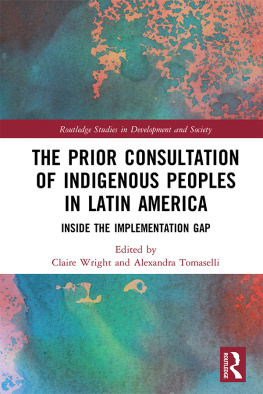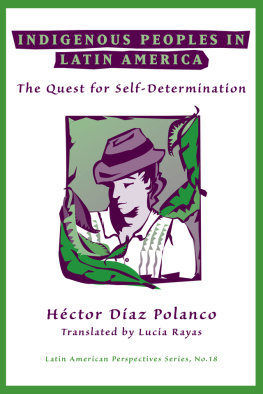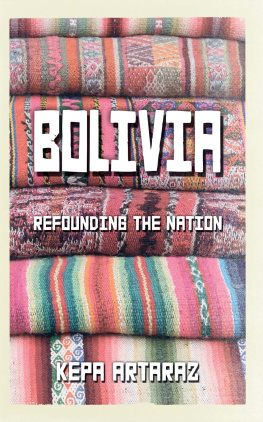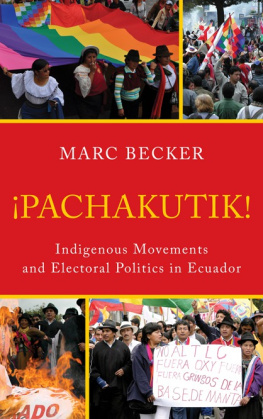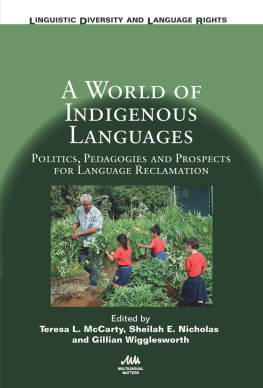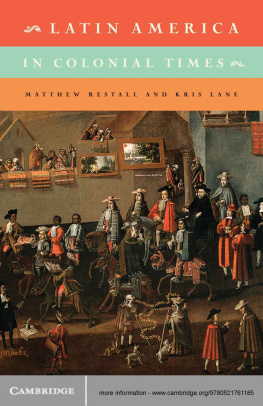INDIGENOUS LANGUAGES, POLITICS,
AND AUTHORITY IN LATIN AMERICA
INDIGENOUS
LANGUAGES,
POLITICS, AND
AUTHORITY IN
LATIN AMERICA
HISTORICAL AND
ETHNOGRAPHIC PERSPECTIVES
Edited by ALAN DURSTON
and BRUCE MANNHEIM
University of Notre Dame Press
Notre Dame, Indiana
University of Notre Dame Press
Notre Dame, Indiana 46556
undpress.nd.edu
Copyright 2018 by University of Notre Dame
All Rights Reserved
Published in the United States of America
Library of Congress Cataloging-in-Publication Data
Names: Durston, Alan, 1970 editor. | Mannheim, Bruce, editor.
Title: Indigenous languages, politics, and authority in Latin America : historical and ethnographic perspectives / edited by Alan Durston and Bruce Mannheim.
Description: Notre Dame, Indiana : University of Notre Dame Press, 2018. |
Includes bibliographical references and index. | Identifiers: LCCN 2018011947 (print) | LCCN 2018013951 (ebook) | ISBN 9780268103712 (pdf) |
ISBN 9780268103729 (epub) | ISBN 9780268103699 (hardcover : alk. paper) |
ISBN 0268103690 (hardcover : alk. paper)
Subjects: LCSH: Indians of South AmericaLanguagesPolitical aspects. | Indians of South AmericaLanguagesSocial aspects. | Indians of South AmericaLanguagesHistory. | Indians of MexicoLanguagesPolitical aspects. | Indians of MexicoLanguagesSocial aspects. | Indians of Mexico LanguagesHistory. | Indians of Central AmericaLanguagesPolitical aspects. | Indians of Central AmericaLanguagesSocial aspects. |
Indians of Central AmericaLanguagesHistory.
Classification: LCC P119.32.S63 (ebook) | LCC P119.32.S63 I53 2018 (print) | DDC 498dc23
LC record available at https://lccn.loc.gov/2018011947
This paper meets the requirements of ANSI/NISO Z39.48-1992
(Permanence of Paper).
This e-Book was converted from the original source file by a third-party vendor. Readers who notice any formatting, textual, or readability issues are encouraged to contact the publisher at ebooks@nd.edu
To the memory of Sabine MacCormack
ACKNOWLEDGMENTS
This volume was originally conceived by Sabine MacCormack (1941 2012), who invited most of the contributors and asked Alan Durston and Bruce Mannheim to take on editorial responsibilities. Now that it is coming out the editors would like to dedicate it to her memory. We thank Princeton University Press for allowing us to reproduce The Discourse of My Life: What Language Can Do, (pp. 170201) of Sabine MacCormacks On the Wings of Time: Rome, the Incas, Spain, and Peru (2007), as her contribution to this volume.
We are grateful to the authors for their patience with a prolonged editorial process. We would also like to thank Stephen Little, Eli Bortz, and Rebecca DeBoer, of the University of Notre Dame Press, for shepherding the project through to its conclusion, and Elisabeth Magnus for her rigorous copyediting.
Introduction
ALAN DURSTON AND BRUCE MANNHEIM
Indigenous languages have been used to express new understandings of community, polity, and authority throughout the history of Latin American societies. Additionally, specific Amerindian languages have themselves embodied authority as varieties of special standing in the colonial regime, or as emblems of national or ethnic identities. Ethnographic research is revealing how speakers today employ socially stratified registers that index and reproduce hierarchies among them. This volume explores how indigenous languages have functioned as vehicles of social and political orders from the sixteenth century to the present. Our focus is on languages that have been prominent in multiethnic colonial and national societies and are well represented in the written recordGuarani, some of the Mayan languages, Nahuatl, and Quechua are the main examples, but certainly not the only ones.
The work assembled here challenges unspoken but persistent assumptions about the postconquest history of indigenous languages; once these assumptions are set aside, their long-neglected centrality to the political history of the region becomes evident. A first assumption could be termed the assumption of linear decline: that indigenous languages have, at best, held on in the face of the onslaught of European languages, with some merely declining more slowly than others. It is abundantly clear that indigenous languages expanded into new arenas in the wake of the Iberian invasions and that when they did lose ground the gains often went to other indigenous languages. Similarly, in a pattern far from linear decline, the demographic falloff in Quechua monolingualism in the southern Peruvian highlands is relatively recent, a product of changes in the rural productive economy and in education in the second half of the twentieth century, rather than of colonial-era language policy.
A second assumption, deriving from an ideology of language both anachronistic and acontextual, construes indigenous languages as monoethnic and monocultural, defining clearly bounded populations. particularly through differential access to linguistic repertoires, but the boundaries of a linguistic systema named language or a named variety of a languagedo not necessarily coincide with a social or political boundary.
A key implication of mobility/mutability is the need to study distinct registers of a language and how they are regimented. Scholars have often failed to notice socially grounded registers because they have tended to focus on the formal, written representation of grammars to the exclusion of everyday contexts. Ethnicity is not the mechanical reflection of abstract knowledge of a set of lexical and grammatical forms or of an equally abstract heritage (inherited from where?). For speakers of Kichee Maya, ethnicity is an interactional achievement, arrived at through a complex layering of linguistic accommodation and differentiation: (1) foundationally at the hyperlocal level that is characteristic of Mesoamerica as a region, in which speakers from local settlements strive to differentiate themselves from neighboring settlements, drawing on historically Mayan and historically Spanish resources to do so; (2) a layer up, where, at a local level again, speakers differentiate themselves by class/ ethnic affiliation through interaction between local varieties of Mayan and Spanish; and (3) at a pan-Mayan level, where Mayan intellectuals differentiate themselves from non-Mayans through a regimented purist register of Kichee.
The proliferation of new registers takes a variety of forms. The spread of linguistic features from indigenous languages to local varieties of Spanish is not restricted to the usual second-language phenomena, such as the deployment of Quechua vowel space in second-language Spanish or the expansion of the periphrastic past tense (he venido instead of vine) or of the mirative (habia sido) in Spanish, but in Vallegrande, Bolivia, can include the borrowing of ejectives (glottalized sounds) into Spanish, forming an affectively charged, indigenized register of the local Spanish. In both cases, Spanish-accommodated registers of indigenous languages have been added to regional repertoires, with specific social conditions within which they come into play.
This volume is the first to address the political uses of Latin American indigenous languages in historical perspective and is among the first to present a collection of interdisciplinary research covering different time periods and geographical areas. In this last regard it joins two recent compilations:



